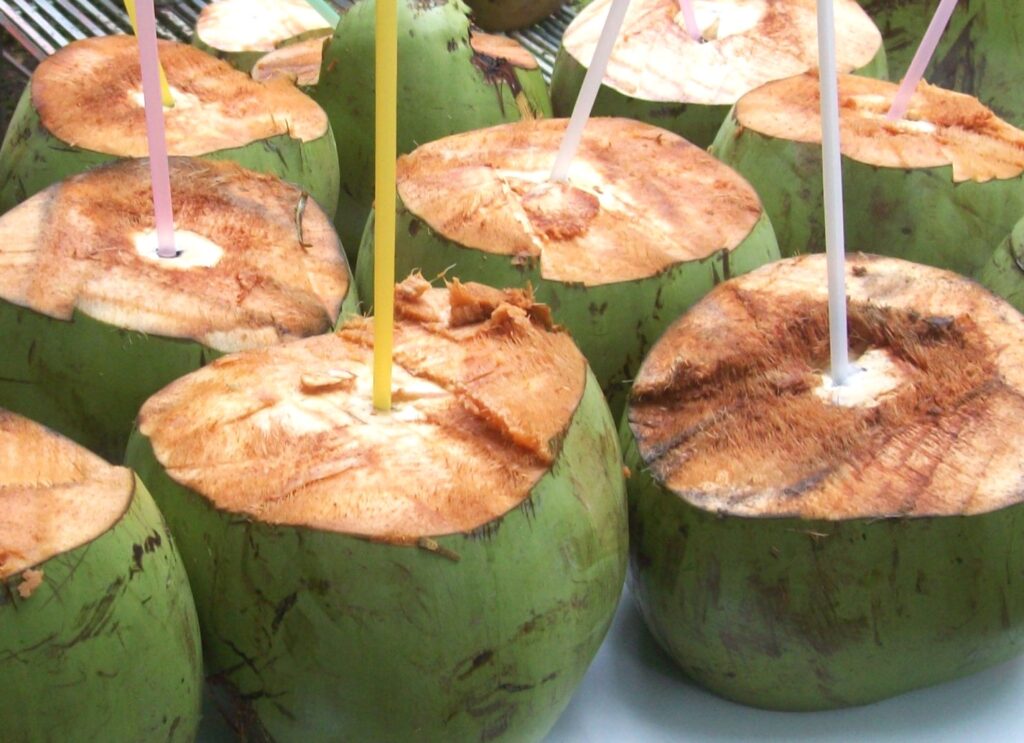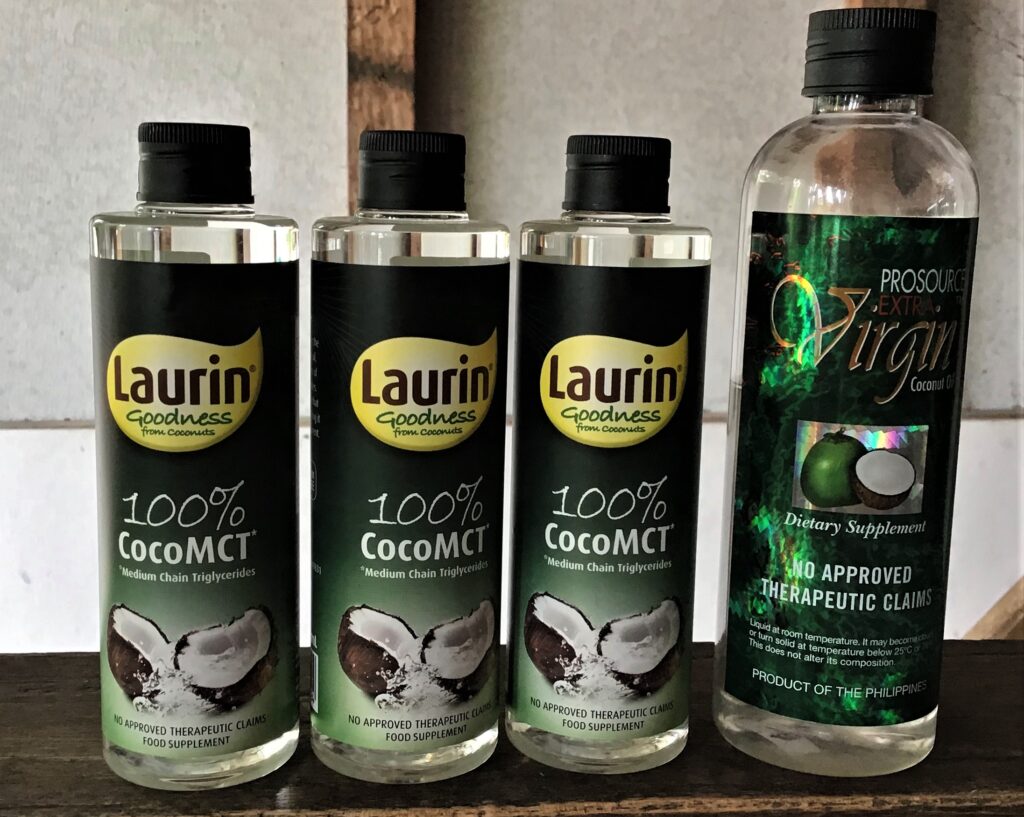Text and Photos by Henrylito D. Tacio
Coconut oil has grown in popularity in recent years. Results of the survey conducted in 2016 in the United States showed that 72% of people believed that coconut oil was healthful.
It’s no wonder why many manufacturers have commenced incorporating coconut oil in packaged products like sweets, shampoos, coffee, and smoothies. Several people around the world are now using it for cooking.
Coconut oil is most potent when it’s virgin – and Filipinos call it virgin coconut oil (VCO). “VCO is a natural oil from fresh, mature kernel of the coconut,” explains the book, Compendium of Commercially-Viable Coconut Technologies, published by Philippine Council for Agriculture, Aquatic and Natural Resources Research and Development (PCAARRD).
The Philippine Coconut Authority (PCA) has this to say: “VCO is the purest form of coconut oil, water white in color and has not undergone oxidation. It is the oil obtained from the fresh and mature kernel of coconut by mechanical or natural means with or without the use of heat, without undergoing chemical refining, bleaching or deodorizing, and which does not lead to the alteration of the nature of the oil.”
The late National Scientist Dr. Conrado S. Dayrit was touted to be the Father of VCO. His book, The Truth About Coconut Oil, published in 2005, became a bestseller and elevated coconut oil from folk medicine to a scientific therapy. He was a cardiologist and professor of pharmacology at the University of the Philippines College of Medicine.
“Today, people are returning to natural diets in order to live healthier and happier lives – the hallmarks of ‘wellness’ – and science has been validating the benefits,” Dayrit wrote in the prologue of Coconut Oil: From Diet to Therapy which he co-authored with his son, Fabian M. Dayrit. “One of the natural foods being rediscovered is coconut. Although vilified as a cause of heart disease, coconut oil has always shown itself to be a healthy and curative oil. Numerous studies using the tools of modern science are finally revealing – and validating – the beneficial effects of coconut oil.”
As the height of the novel coronavirus (2019-nCoV) scare, the Ateneo de Manila University (ADMU) published a paper, authored by Dr. Fabian M. Dayrit and Dr. Mary T. Newport, which suggest virgin coconut oil (VCO) as antiviral agent against the dreaded 2019-nCov.
“Several researchers have been designing drugs to specifically target protease enzymes in coronavirus, but testing for these drugs is many months away,” the Dayrit and Newport wrote in their paper that was posted at the ADMU website. “What if there is a treatment candidate against the coronavirus that might already be available and whose safety is already established?”
Dayrit is a professor emeritus of ADMU and was elected Academician of the National Academy of Science and Technology. Newport, on the other hand, is an American doctor who works at the Spring Hill Neonatology in Florida.
Studies show VCO is rich in lauric acid, a medium-chain fatty acid (MCFA) that is converted to monolaurin by the human body. “Fifty percent of coconut oil is lauric acid, a compound found in human breast milk, which makes it one of the best food sources for this nutrient available,” Ty Bollinger, a best-selling author, medical researcher, and health freedom advocate.


“Lauric acid and monolaurin, its derivative, have been known for many years to have significant antiviral activity,” Dayrit and Newport wrote. “Sodium lauryl sulfate, a common surfactant that is made from lauric acid, has been shown to have potent antiviral properties.”
The two authors explained three mechanisms as to the antiviral activity of lauric acid and monolaurin. “First, they cause disintegration of the virus envelope; second, they can inhibit late maturation stage in the virus replicative cycle; and third, they can prevent the binding of viral proteins to the host cell membrane,” the wrote.
Dayrit and Newport said that VCO and its derivatives have been found to be safe and effective antiviral compounds in both humans and livestock. “Because of the antiviral and antibacterial protection that it provides to animals, coconut oil, as well as lauric acid and monolaurin, is used in farm animals and pets as veterinary feed supplements in chicken, swine and dogs,” they wrote. “Monolaurin has been shown to effectively protect chicken against avian influenza virus.”
In small clinical studies, VCO has been shown to have anti-HIV properties. HIV is human immunodeficiency virus, the microorganism that causes Acquired Immune Deficiency Syndrome (AIDS).
“The first clinical trial using coconut oil and monolaurin against HIV/AIDS was conducted in the Philippines,” Dayrit and Newport wrote of the study that involved 15 HIV patients, aged 22 to 38 years old, for 6 months. “There was only one fatality and 11 of the patients showed higher CD4 and CD8 counts after 6 months.”
Meanwhile, during the First World Coconut Congress two years ago, Newport reported that VCO can also be used as adjuvant treatment for cancer. “Clinical trials on the use of VCO in ketogenic diet as supportive treatment for cancer has been shown to be highly promising under a clinical trial at the Paracelsus Medical University (PMU) in Salzburg, Austria,” said a press release circulated by the Growth Publishing.
The VCO is a recognized source of beneficial fatty acid metabolized in the liver as ketones in ketogenic diets. In the PMU clinical trial, the target is for ketogenic diet to achieve the so-called “Warburg effect,” where cancer cells are prevented from using glycolysis in order to produce the organic chemical ATP (Adenosine triphosphate) needed in the multiplication of cancer cells.
“Based on the results of rigorous preclinical and clinical studies performed thus far, the ketogenic diet would appear to be a promising and powerful option for adjuvant therapy for a range of cancers,” the PMU study said.
Fats in VCO are known as medium chain triglycerides (MCTs), which means the fatty acids are shorter than most other fats. “When you eat these types of fats, they go straight to the liver, where they are used as a quick source of energy or turned into ketones,” the website explains. “Ketones have powerful benefits for the brain.”
As more people are getting older these days, Alzheimer’s disease has become a problem. “In Alzheimer’s patients, there appears to be a reduced ability to use glucose for energy in certain parts of the brain,” healthline.com reports. “Researchers have speculated that ketones can provide an alternative energy source for these malfunctioning brain cells.”
In a study done in 2006, it was found that consumption of MCTs led to improvement in brain function in patients with milder forms of Alzheimer’s. As it is super-rich in ketones, it also relieves symptoms of the disease.
Here are more health benefits derived from VCO, as culled from various sources:
Prevent aging and stress: Some studies have shown that VCO may contain antioxidant properties. These active compounds prevent the formation of free radicals, which cause premature aging. A study done on rodents showed that it can reduce stress resulting from exercise and chronic cold. Other studies showed that VCO could also be useful in treating some kinds of depression.
Good for the heart: Since VCO contain antioxidant properties and vitamin E, it can lower blood pressure from rising. As such, VCO can be capable of preventing heart attack and stroke, of which hypertension is a risk factor. In addition, it protects against heart disease by increasing high-density lipoprotein (HDL) that collects the excess cholesterol in the body for excretion by the liver.
Skin smoother and eye lubricant: Its natural antibacterial, anti-inflammation, and moisturizing properties make the skin smoother and look younger. Also, those aforementioned properties prevent acne and keep the eyes healthier (aside from preventing dryness). In fact, it promotes the production of natural tears and can be used to moisturize the skin around the eyes.
Mouth warrior: The antimicrobial properties found in can get rid of the plaque on the teeth and gums. The moisturizing properties, on the other hand, heals chapped lips. You can also use it like a mouthwash; doing so kill some harmful bacteria in the mouth, aside from improving dental health and reducing halitosis or bad breath.
Aids with digestion: By taking in fat-soluble components like vitamins and magnesium, it helps with food digestion. It also eliminates toxic bacteria Staphylococcus aureus (a very dangerous pathogen) and the yeast Candida albicans, a common source of yeast infections in humans.
With the advancement of modern technology and breakthroughs in science, there will be more health benefits that can be unearthed from coconut oil. The Philippines, however, should lead such studies.
“In the Philippines, if we are to produce more understanding by the world that coconut oil is really quite safe internally and with food, we need to convince the doctors, the academics because they are after all the opinion leaders. They are the ones who told the rest of the world that coconut oil back in the 50s, 60s and onwards was not good for the diet,” said Dr. Vermen M. Verallo-Rowell, entrepreneurial founder of VMV Hypoallergenics who has published more than 150 articles in dermatology scientific journals.
In the United States, VCO has increasingly become popular in natural food circles and with vegans. It was described in a New York Times article as having a “haunting, nutty, vanilla flavor” that also has a touch of sweetness that works well in baked goods, pastries, and sautés.
The Philippines is the second largest coconut producing country in the world, after Indonesia. Of the 12 million hectares total agricultural land, 3.5 million hectares are dedicated to coconut production, the Philippine Statistics Authority (PSA) reports. Most of these coconuts are located in Quezon (10.4%), Zamboanga del Norte (6.6%), and Davao Oriental (4.0%).
Among the provinces with the highest yield are Sultan Kudarat (94.55 kilograms per bearing tree), Palawan (79.33 kilograms per bearing tree), and Zamboanga City (75 kilograms per bearing tree).
The Philippines has introduced VCO to the world in 2000-2001 and remains to be world’s number one VCO exporter. In 2015, VCO was exported to 46 countries, the United Coconut Association of the Philippines said. The top importers were United States, the Netherlands, Canada, Germany, and Japan. Other destinations were Belgium, United Kingdom, South Korea, and Australia. Smaller volumes went to Malaysia, Brazil, Taiwan, South Africa, France, China, Singapore and Czechoslovakia.

